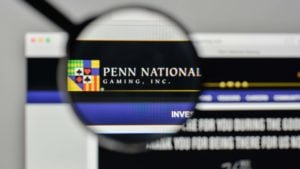To get a sense of just how volatile this market is, consider that Penn National Gaming (NASDAQ:PENN) stock has doubled from its lows. Yet, Penn National stock still is down 74% from its 52-week high.

The decline in PENN stock makes some sense. Casinos nationwide have been shut down amid the response to the novel coronavirus. Penn has a fair amount of debt on its balance sheet. It owes billions of dollars more in lease payments to Gaming and Leisure Properties (NASDAQ:GLPI), which Penn spun off in 2013, and Vici Properties (NYSE:VICI).
But I’ve continually advised investors to take the long view in this market. Indeed, that’s good advice for all of us as we navigate this unprecedented crisis.
Penn National stock is a good example of the potential opportunities available in a market that is only focused on the short term. We will get through this crisis. Our economy will recover. And when it does, PENN should rally.
The Risks Are Real…
Again, it’s not hard to see why some investors see Penn National stock as risky. The company is burning cash as its casinos nationwide stay closed. A report from Macquarie on March 24 suggested the company had just five months’ worth of cash remaining.
Meanwhile, if a short-term recession follows even once casinos re-open, Penn ostensibly could face more trouble. It closed 2019 with $2.3 billion in long-term debt — but that’s not its largest liability.
It carries lease liabilities on its balance sheet at over $8.5 billion. Total lease payments over the next 30 years exceed $20 billion. In the fourth-quarter release in early February, Penn said it expected those cash payments to be roughly $900 million in 2020.
Penn has to make those payments even while its properties are closed. And the worry is that even when they re-open, business will be slow. Consumers may be loath to return to crowded casinos. Customers who have lost their jobs in the current crisis may take time to find new employment — and have the discretionary spending required to visit Penn properties.
To many investors, then, Penn National stock simply is too risky. And they’re not completely wrong. Given debt and lease liabilities, PENN is a high-risk investment right now. But the rewards are huge — and the risks may not be quite what some investors believe.
…But Somewhat Overblown
From both a short-term and long-term perspective, however, the risks may not be what they appear.
Last week, Penn made a deal with GLPI to sell the Tropicana Las Vegas, and land under a project in Pennsylvania, for $337.5 million. Penn won’t get the cash; instead it will get credit for rent going forward. The proceeds should cover about four months’ of lease payments.
Penn also, unfortunately, started furloughing workers on Wednesday. That will lower operating expenses. The company closed 2019 with $438 million in cash, which provides a further cushion.
Again, investors have to understand the risks, and Penn will have short-term challenges. But the deal with GLPI creates a path to get through this crisis.
Meanwhile, the history of the industry suggests it might be more resilient than some believe. In 2009, commercial casino revenues fell just 5%. Regional casinos saw an even smaller decline.
Penn has a strong chance of getting through this crisis. And if it can, the long-term case looks attractive.
The Case for Penn National Stock
After all, it was only two months ago that PENN stock was soaring.
In late January, the company announced that it was acquiring a 36% stake in Barstool Sports for consideration of $163 million. The market loved the deal: PENN rallied sharply.
It’s not hard to see why. Barstool’s audience represents a built-in base for Penn to drive significant revenue from sports betting. That’s a multibillion-dollar opportunity for Penn National — particularly as online sports betting takes hold.
That opportunity still exists, even though PENN now trades below $10 instead of $35.
I expect to see significant pent-up demand in the legacy business as well. The federal government has stepped up with relief, which should provide a bridge for the U.S. economy to bounce back. I still believe this decade will wind up being the Roaring 2020s, as I’ve named it, and casino operators like Penn can be huge beneficiaries.
There are other sports betting plays out there. Diamond Eagle Acquisition (NASDAQ:DEAC) is acquiring fantasy sports operator DraftKings. Eldorado Resorts (NASDAQ:ERI) and Caesars Entertainment (NASDAQ:CZR) are set to merge.
But DEAC hasn’t declined as far as Penn National stock. Eldorado and Caesars don’t have the same edge in sports betting that Penn does with Barstool.
For long-term investors, there are opportunities in this space. I believe PENN is the best of them.
Matthew McCall left Wall Street to actually help investors — by getting them into the world’s biggest, most revolutionary trends BEFORE anyone else. The power of being “first” gave Matt’s readers the chance to bank +2,438% in Stamps.com (STMP), +1,523% in Ulta Beauty (ULTA) and +1,044% in Tesla (TSLA), just to name a few. Click here to see what Matt has up his sleeve now. Matt does not directly own the aforementioned securities.
